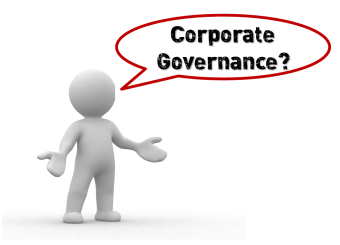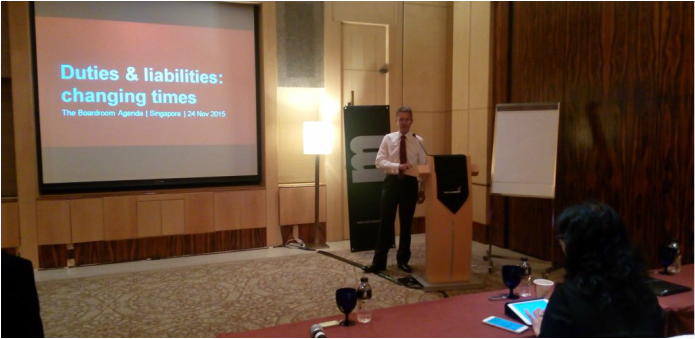|
Nearly fifty chairmen, directors and company secretaries from around South-east Asia, the Middle East and Northern Africa gathered at the Ritz–Carlton Millenia Hotel in Singapore this week for The Boardroom Agenda conference. Delegates received presentations, shared stories and debated issues over two days (23–24 November), under the Chatham House rule. I had the honour of contributing to the discussion on the second day. Here are some of the takeouts:
I've come away from the conference with the impression that the quality of corporate governance and board practice in Asian and Middle Eastern economies is rapidly improving. Overall, the hunger to improve board effectiveness was plain to see, as was the desire to learn from those with experience gained elsewhere (if the many conversations, requests to return and business cards in my satchel are any indication). However, care must be taken to ensure that models and frameworks in use in the Anglosphere are not blindly implemented in this region. Such colonialism is unwarranted and patronising, and it may be culturally demeaning as well.
0 Comments
I will be in Singapore early next week (23–25 November) for the "The Boardroom Agenda" conference at the Ritz-Carlton Millenia. The attendance list includes senior chairmen, directors, company secretaries and chief executives from across Asia and the Middle East. The main aim of the conference is to 'raise the bar' on board performance and take the board's effectiveness to greater heights. In addition to five plenary presentations, two parallel streams (Board Insiders and Council, and Board Guardians) of cases studies, mini think-tanks and deep dive sessions are scheduled. The third day is dedicated to an optional masterclass workshop. My main contributions will be on Day Two. I will be a panelist (The Board Governance Dialogue); delivering a presentation (Responding to the re-emergence of director's duties and liabilities); and, chairing the Board Insiders and Council stream. For more information: Finally, if you are in Singapore on Mon 23 or Tue 24 and wish to meet privately to discuss other matters of interest, I am available to do so over dinner. Please get in touch if you want to take advantage of this.
 What is it with corporate governance? Thirty years ago, the term hardly rated a mention in business magazines—let alone general conversation. Now, corporate governance is seen by many (tacitly at least) as a panacea for all manner of corporate ills and director recalcitrance. The pursuit of best practice models (the one-size-fits-all approach) has become commonplace, even though the operating context of and challenges faced by small and medium companies are fundamentally different from those of publicly listed corporations. Mak Yuen Teen, an associate professor of the NUS Business School and corporate governance expert thinks the one-size-fits-all approach is myopic and has just gone on record on the matter. Furthermore, many commentators, regulators and serving directors seem to have lost sight of Sir Adrian Cadbury's commentary, that corporate governance is primarily about the performance of the business. My experience, in research and as a serving director bears this out.
I was party to a fascinating conversation on Friday evening, with a gentleman—in the full sense of the word—in the lobby of a comfortable hotel in Lisbon, Portugal. The gentleman, a learned business professor, advanced in years but razor sharp of mind, was asked to comment on the Portuguese political situation, particularly as it related to the recent election and the selection of a new Prime Minister. After a considered pause of some twenty seconds or more, and the repeated stroking of his furrowed brow, he responded. Speaking in somewhat broken but ultimately capable English, the professor said "Aah, the situation is interesting, very interesting. We have many challenges; Portugal needs strong leadership." The professor went on to describe several challenges and difficulties, including that the highest polling party lacks the numbers to nominate their leader as Prime Minister and govern by majority. A complicating factor is that the President of Portugal will soon complete his term. The situation is unstable. If it cannot be resolved quickly, a coalition of minor parties including an extreme leftist party may try to usurp power and turn away from the gains made in recent years. The professor suggested that the main casualities will be the economy and the wellbeing of the people. The small audience of four leaned in as the professor spoke, enthralled by the palpable intensity of the situation. The parallels and lessons for companies, and boards in particular, are stark. Boards that are not united in purpose cannot hope to lead the company they are charged with overseeing effectvely. Similarly, chief executives without a clear mandate to lead risk stasis. Those that run agendae in variance to agreed priorities or strategies put the future prosperity (and, potentially, the viability) of the business at risk. In society, democracy has it benefits, but only to a point. When a group of people—be it the electorate, a group of executive managers or a board of directors—can't agree, the organisation can't hope to compete effectively or make progress towards value creation goals. As with the Portuguese election result, such situations in business are not sustainable. Strong leadership is required, from the top, to break the deadlock. As we parted ways, the professor graciously invited me to return to Portugal, both to spend more time with him and to share insights with business leaders. If the quality of our brief exchange is any indication of what might be possible in a wider context, I look forward to that day, and very much so. Thank you professor.
The second day of the 11th European Conference on Management, Leadership and Governance opened with an outstanding keynote delivered by Lt. Col. Paulo Nunes of the Portugese Military Academy. Nunes is the Programme Leader of a NATO-sponsored multinational cyber defence education and training (MN CD E+T) project (click for more details). The digital and physical worlds are, increasingly, being integrated—to the extent that some would suggest the existence of a blurred reality. 'Cyber' is a red-hot topic in both the business and military worlds, to the extent that it has become the frontline of various attempts to achieve both legal and illegal political, military and economic objectives. Nunes reported that the biggest weakness in the system is people, the human firewall. The MN CD E+T project has been commissioned to design and implement an integrated approach to increasing awareness and providing training at the nation, NATO, EU and business levels to prepare, detect and respond the various weaknesses and threats. This includes work to determine expected behaviours and desired operational outcomes, and then to develop and deliver appropriate learning systems. Seventeen nations are currently involved in the programme, with more enrolments expected in the coming months. If implemented well, the programme offers considerable benefits to businesses of all sizes and types. Boards and directors would be well advised to receive briefings and allocate time to think critically through the issues and implications.
Demands on boards to ensure desired company performance outcomes are achieved have led to increased scrutiny of directors and director effectiveness in recent years. Performance evaluation systems (PES) have emerged as a tool of choice to assess director performance. However, the influence of such systems on business performance is largely unknown. Marie-Josée Roy reported the findings of a recent Canadian study that examined PES closely, in an attempt to bridge the knowledge gap. Roy's survey-based study of 89 large Canadian companies identified three distinct types of PES (exemplar, formal, minimalist—definitions of which were provided in her supporting paper). The typology was based on descriptions provided by survey respondents. Her analysis revealed some interesting correlations, including that boards with an exemplar PES were more likely to be involved in important board roles of strategy and monitoring, and were more likely to be effective in these roles. While Roy's study was helpful in that it provided empirical evidence on board performance evaluation systems, it did not resolve the crucial question of how, in actuality, an effective PES might work. Survey respondents can (and often do) provide answers of convenience. Sadly, knowledge of whether any PES in use is actually useful (or not) for improving director and board performance remains largely unanswered. Other approaches to research, including longitundinal observations of boards in action and (probably) pyschological assessments are likely to be required if tangible progress is to be made. Even then, another even more vexing question—of whether improved board effectiveness leads to improved company performance—lies in wait.
I had the pleasure of chairing the 'emerging economy' session at ECMLG this year. Three papers were presented by researchers who have been investigating the emergence and conduct of corporate governance in Romania, Tunisia and Lithuania:
These studies were useful to the extent that they highlighted some interesting variations between the dominant understanding of corporate governance in developed nations and developing nations. They also highlighted the relative maturity of methodological approaches to research being conducted in developing nations. Much of the research continues to utilise methodologies and approaches that were common in developed nations some years ago. As such, researchers based in developing nations may well benefit from robust discussions with colleagues from developed nations, to take advantage of contemporary and emerging research techniques.
The translation of strategy and goals into actionable targets and outcomes is a challenge for many organisations. Rob ter Hedde and Benny de Wall (Utrecht, Netherlands) have been investigating this challenge. While many think in terms of 'hard priorities' of operational efficiency and organisational design, ter Hedde and de Waal focused on human factors. They presented a model consisting of four dimensions—strategy translation; dialogue and action orientation; continuous improvement and organisational learning; and, information and visualisation—and suggested that the link between strategy and effective implementation was contingent on this four dimensional model being set in motion. Their results showed that anchoring the organisation's objectives and strategy in the minds, hearts and hands of the people (staff and other stakeholders) is crucial for performance improvements. While not explicitly stated, this research reinforces the importance of clearly annunciating core purpose—the 'why'. People are more likely to get behind causes that things. The civil rights leader, Martin Luther King, provided a very famous demonstration of this with his Dream speech. Just imagine the [non]impact if MLK had uttered "I have a plan...".
The 11th European Conference on Management, Leadership and Governance (ECMLG) got underway this morning, at the Military Academy in Lisbon, Portugal. Nearly 90 researchers, from 28 countries have assembled to present their research and debate emergent ideas and models. The overall theme of the conference was set by Colonel Nuno Lemos Pires when he delivered the opening keynote address From Leaders to Commanders. His talk provided some interesting contrasts between leadership in a civilian context and a military context:
Notwithstanding these contrasts and tensions, Pires then described several attributes of effective military leadership that appear to be applicable in the civilian context:
Leadership is a complex topic. In drawing both contrasts and parallels, including a direct challenge of the 'command and control' perception of military leadership, Pires set the scene well set for an interesting two days ahead.
Thirty-six researchers from over twenty countries gathered in Brussels last week (29–30 October) to discuss emerging developments in the fields of corporate governance and board practice. While some of the contributors are 'pure' academics committed to theory development, others (like me) span academia and practice. Consequently, a sharp 'real world' edge was apparent. Here are a few of the insights and topical themes that emerged:
Two other developments that stood out concerned the conduct of board research:
|
SearchMusingsThoughts on corporate governance, strategy and boardcraft; our place in the world; and other topics that catch my attention. Categories
All
Archives
May 2024
|
|
Dr. Peter Crow, CMInstD
|
© Copyright 2001-2024 | Terms of use & privacy
|



